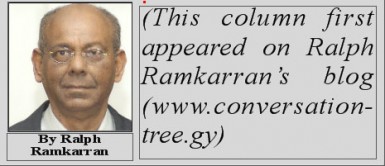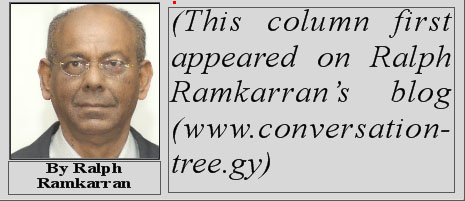President Ramotar said in his address to the nation last week that if the opposition persists with the no-confidence motion, he will “prorogue or dissolve” the National Assembly. These are two completely different options.
The proroguing of the National Assembly means the termination of this session only and all pending business, which is not postponed to the next session but concluded in their unfinished state. The prorogation can only last for up to six months and elections are not constitutionally mandated. A new session resumes by proclamation. There are political constraints as to how long, within the six-month period, the government may wish to prorogue. A dissolution has the effect of terminating the life of the National Assembly. It has to be resumed in four months and cannot be resumed except after elections.
The government’s fiscal year ends on December 31. It is required to present the estimates within ninety days thereafter. The Government has authority to spend during this period and up to a month thereafter if an Appropriation Act is not passed. In theory, the government cannot spend any money after April 30 if estimates, followed by an Appropriation Act, are not passed. The Appropriation Act gives it authority to withdraw funds, approved by the National Assembly, from the Consolidated Fund.
 The political heat that would be generated by prorogation would mean that the government would be unlikely to later obtain opposition support to approve a budget and estimates. It would, therefore, have to dissolve the National Assembly in April and call elections. Of course, the government has been spending without parliamentary approval and may continue to do so where it deems that the spending is necessary due to ‘unforeseen’ and similar circumstances. Even though the government would hardly be able to justify that its own act of prorogation creates ‘unforeseen’ circumstances, stranger things have happened.
The political heat that would be generated by prorogation would mean that the government would be unlikely to later obtain opposition support to approve a budget and estimates. It would, therefore, have to dissolve the National Assembly in April and call elections. Of course, the government has been spending without parliamentary approval and may continue to do so where it deems that the spending is necessary due to ‘unforeseen’ and similar circumstances. Even though the government would hardly be able to justify that its own act of prorogation creates ‘unforeseen’ circumstances, stranger things have happened.
But what about the President’s challenge to the AFC to “bring it on” and “make my day?” A prorogation of the National Assembly as a tactic to delay holding elections to a later time that is more favourable to the government would not be unusual. Prime Minister Stephen Harper did it in Canada when a no-confidence motion was threatening his second minority government. But in our case, where the government dared the AFC, a prorogation would create the impression that it has dropped its bravado and is slipping through the back door.
A confrontation is likely to be inevitable on Monday, since the opposition appears to have agreed that the no-confidence motion will be given priority. Their majority would enable them to suspend the Standing Orders for this purpose or to determine when the National Assembly should meet. The President, presumably, will announce his decision of whether to prorogue or dissolve.
What is surprising is not that the government is being brought down by a no-confidence motion, or forced into elections because of the threat of it, but that its life has lasted for so long – three years. Minority governments survive for this length of time only where they have a guarantee of support by a smaller party. What is unusual in Guyana is that the government did not offer a role in government to one or both of the opposition parties. While the bitterness of our political past, driven by ethnic suspicions, was and is a major obstacle, it is these same factors that the PPP took cognizance of in determining its fundamental policy choices, based on promoting a political solution, of a ‘national patriotic front,’ and ‘winner does not take all,’ two sides of the same coin, both of which were designed for the PNCR’s participation.
The opposition has failed to highlight and promote in the past three years this most critical issue facing Guyana today – the need for a political solution. It did not use the opportunity during this period to highlight and maintain at the forefront of political discourse that a place at the executive table is a pre-requisite for stable governance by consensus. They went along with the minority status quo, more concerned about the allegation that all they are interested in is political power and maybe for other political considerations and calculations. Well, their simple response could have been, what is the PPP interested in, if it hogs political power all for itself, with only minority support?
Whenever elections are held, the government’s campaign strategy of blaming the opposition for obstructing progress has already been designed. It can be effective to mobilise its own supporters, whom it needs to re-energise. All it needs is one more seat, a distinct possibility.
The opposition’s strategy is more difficult to discern. If it falls in the trap of a defensive posture, defending itself against the government’s assertions, and fails to engage and inspire the electorate with a larger vision of Guyana’s future, where the major stakeholders share the executive in a structured and long-term relationship, based on constitutional prescriptions, then the PPP will be allowed to get off the hook, will not have to answer the most fundamental question facing the Guyanese people for all of its post-Independence history, the question of the structure and nature of our governance, and we will be condemned to another round of ‘winner take all’ politics.
Guyana can only move forward in unity, or not at all.








